What is urinary incontinence?
Urinary incontinence is an uncontrolled loss of urine, which can be caused by disruptions between your brain, spinal cord, bladder and pelvic support structures. Urinary incontinence affects over 40% of American women across all age groups and is common even among younger women.
Types of urinary incontinence
Urinary incontinence comes in various forms and impacts women differently. From stress incontinence to functional limitations, each variation requires distinct approaches for improved bladder health and overall well-being.
- Stress incontinence: Stress incontinence occurs when physical activities such as coughing, sneezing or lifting lead to unintentional urine leakage. It’s common in women, particularly after childbirth or menopause, and results from insufficient support for the bladder and urethra.
- Urge incontinence: Urge incontinence, often associated with an overactive bladder, involves a sudden, intense urge to urinate, leading to involuntary urine leakage. Overactive bladder, characterized by a heightened urge to urinate, contributes to this condition.
- Overflow incontinence: Overflow incontinence happens when your bladder doesn’t empty fully, leading to a constant, involuntary leakage of small amounts of urine. You may have trouble going to the bathroom or feel your bladder is not empty after urinating.
- Functional incontinence: Functional incontinence results when you have the physical or cognitive capacity to control your bladder but face challenges reaching the toilet in time due to other health issues.
- Mixed incontinence: Mixed incontinence is a combination of stress and urge incontinence. You may involuntarily leak urine during activities that exert pressure on your bladder (stress incontinence) and have sudden urges to urinate that may lead to leakage (urge incontinence).
Urinary incontinence symptoms
Although urinary incontinence comes in different types, they all share similar symptoms—mainly, leaking urine unintentionally. Accidents or leaks may occur only when pressure is placed on the bladder, such as when you’re laughing or sneezing, or they may happen unexpectedly.
You may have urinary incontinence if you experience the following symptoms:
- A sensation that you did not fully empty your bladder
- Feeling a need to urinate even if your bladder is only partially full
- Frequent trips to the bathroom
- Frequent, urgent need to urinate
- Leaking urine when trying to reach the toilet
- Leaking urine when you laugh, cough, sneeze or exercise
- Recurrent urinary tract infections
- Weak urine stream
When to see a doctor
See your women’s health provider if symptoms affect your daily life. Urinary incontinence is not a natural part of getting older or a condition you must accept. Your provider can offer many effective treatments.
Scheduling an appointment is also important if you experience incontinence alongside pain or blood in your urine. These may be signs of other medical conditions.
Causes of urinary incontinence
Urinary incontinence can occur for many reasons. Some relate to your diet or medications, while others are due to medical conditions and hormonal changes.
-
Temporary urinary incontinence
Brief and reversible, temporary urinary incontinence is triggered by factors that are generally easy to treat and do not have a lasting impact. Those factors include:
- Beverages: Certain drinks, such as caffeine and alcohol, can irritate your bladder, leading to temporary incontinence.
- Constipation: Impacted stool in the rectum can put pressure on your bladder, causing short-term incontinence.
- Medications: Some medications, such as diuretics and blood pressure medications, may increase urine production, contributing to incontinence.
- Pregnancy: The physical changes during pregnancy, including pressure on your bladder, can lead to temporary incontinence.
- Urinary tract infections (UTIs): Infections in the urinary tract can cause irritation and result in interim incontinence.
-
Persistent urinary incontinence
Persistent urinary incontinence refers to continued, ongoing involuntary urination. It can result from various factors, such as:
- Cancer: Bladder cancer can impact the urinary system, leading to incontinence.
- Menopause: Hormonal changes during menopause can contribute to weakened pelvic muscle tone, affecting bladder control.
- Obstruction: Physical blockages, such as tumors or urinary stones, can obstruct normal urinary function, resulting in persistent loss of bladder control.
- Neurological disorders: Conditions such as multiple sclerosis and Parkinson’s disease can affect nerve signals involved in bladder control, leading to continued incontinence.
- Pelvic floor disorders: Weakness or dysfunction of your pelvic floor muscles, crucial for bladder control, can lead to persistent incontinence.
Risk factors for urinary incontinence
Risk factors that contribute to urinary incontinence include some lifestyle elements you can change and many factors you cannot. Understanding your risk factors can help you avoid or better manage incontinence.
- Age: As you get older, muscles in your bladder and pelvic region weaken.
- Excess weight: Obesity puts added pressure on the bladder and the muscles around it, increasing the risk of incontinence. Maintaining a healthy weight through regular exercise and a nutritious diet can help reduce your risk.
- Genetics: Certain genetic conditions influence the strength and integrity of pelvic floor muscles and connective tissues. Your risk of incontinence increases if you develop weak pelvic floor muscles.
- Sex: Women are at greater risk for urinary incontinence due to factors including multiple childbirths, particularly vaginal deliveries, and hormonal changes during menopause.
- Smoking: Smoking is linked to chronic coughing, which can weaken pelvic muscles and contribute to stress incontinence. Quitting smoking benefits your overall health and reduces your risk.
Diagnosing urinary incontinence
Urinary incontinence is typically something you can identify on your own. However, your gynecologist or women’s health provider can help you learn its cause so you can work together to find a treatment. Diagnosing the cause of urinary incontinence involves a physical exam and lab and imaging tests. Your provider may also ask you to log certain information in a bladder diary.
-
Medical history and exam
During your visit, your provider will conduct an in-depth medical history review and ask you questions about your lifestyle and whether you experience other symptoms. The goal is to identify a possible cause and learn which type of urinary incontinence you have.
Your provider may also perform a stress test, in which you cough with a full bladder to see if you have any leakage.
Before or after the exam, your provider may ask you to keep a bladder diary, in which you log information about fluid intake, your bathroom habits, when you leak and other factors that can help them reach an accurate diagnosis.
-
Imaging and tests
After your physical exam, your provider may order additional studies and tests to help pinpoint specific issues causing or contributing to urinary incontinence.
- Bladder stress test: This evaluation observes urine loss during activities, such as coughing or laughing.
- Cystoscopy: A tiny camera, inserted through the urethra, allows your provider to see inside your bladder and urethra to identify any abnormalities.
- Cystourethrogram: This imaging tests combines a contrast dye injected into the bladder with X-ray imaging that can help reveal problems with urinary function.
- Pad test: For this test, you will wear pre-weighed pads that help your provider see how much urine you lose over a specific timeframe.
- Ultrasound: This imaging test uses soundwaves to produce images of your bladder.
- Urodynamic tests: Urodynamic tests measure pressure changes as your bladder fills and empties to help your provider understand how well your bladder and urethra function.
- Urinalysis: A urinalysis involves analyzing a urine sample to detect a health condition, such as a UTI, that may be causing or contributing to your urinary incontinence.
Urinary incontinence treatment
Urinary incontinence can significantly impact your quality of life, but various treatment options, ranging from noninvasive to surgical procedures, exist to help you address and manage this condition. Exploring these diverse approaches provides you with choices tailored to your unique needs and preferences.
Lifestyle changes
The first line of urinary incontinence treatment typically involves lifestyle changes to ease symptoms. Your provider may recommend:
- Eating more fiber to limit constipation
- Establishing a consistent bathroom schedule to promote better bladder control
- Limiting caffeine and alcohol
- Maintaining a healthy weight
- Managing conditions, such as diabetes, that can exacerbate incontinence symptoms
- Quitting smoking, as it can positively influence bladder function
Behavioral therapy
Behavioral therapy focuses on your bathroom habits and patterns to help you gain better control over bladder function. Treatments include:
- Bladder training: This structured technique helps expand your bladder’s capacity by teaching you to gradually increase time between bathroom visits. Bladder training is particularly beneficial for those experiencing urge incontinence.
- Timed voiding: You establish and follow a set schedule for bathroom visits to help reduce the likelihood of accidents.
- Urgency suppression: Urgency suppression techniques include controlled breathing, distraction and pelvic floor exercises to counteract the urgent need to urinate. The practice gives you more control over your bladder responses.
Pelvic floor physical therapy
Pelvic floor physical therapy, guided by specialized therapists, involves exercises to address specific muscle imbalances, weakness or tension that contribute to urinary incontinence. Your therapist will teach you exercises and use other specialized therapies to improve bladder control, including:
- Biofeedback: Sensors provide visual or auditory feedback on pelvic floor muscle activity to help improve your awareness of and control over these muscles.
- Electrical stimulation: Mild electrical pulses stimulate pelvic floor muscles to make them stronger and better able to control the flow of urine.
- Pelvic floor exercises: These exercises involve contracting and relaxing the pelvic floor muscles. Regular pelvic floor exercises, such as Kegels, can help you build muscle tone and endurance, providing better support for your bladder and reducing the risk of leaking.
- Vaginal cones: Vaginal cones are weighted devices placed in the vagina to strengthen pelvic floor muscles. Regular use helps build strength and stability of bladder and other pelvic floor muscles.
Medical devices
Incontinence pads and disposable diapers can help you manage incontinence without a prescription. However, you have other options if those do not work well for your lifestyle.
- Catheter: This thin tube is carefully inserted into the bladder to help drain urine.
- Pessary: A pessary is inserted into the vagina to offer structural support to the bladder and adjacent tissues. It can also address concerns related to pelvic organ prolapse and stress incontinence.
- Urethral insert: A urethral insert is a soft balloon that can be inserted to prevent leaks and removed when you need to urinate.
- Vaginal insert: Similar to a tampon, this insert goes into the vagina and puts pressure on the urethra. The added pressure helps prevent leaks. You can purchase these over the counter.
Medications
In some cases, your provider will prescribe medications to address underlying causes of urinary incontinence. Those medications can include:
- Anticholinergics: Anticholinergic medications help control overactive bladder symptoms by blocking certain nerve signals, reducing bladder contractions and minimizing urgency.
- Mirabegron: Mirabegron is a medication that relaxes the bladder muscles, increasing the bladder’s capacity to hold urine and reducing symptoms of urgency and frequency.
- Topical estrogen: Topical estrogen, often in the form of creams or patches, may be recommended for postmenopausal women to address changes in the urethra and vaginal tissues, improving continence.
Interventional therapies
Interventional therapies offer more advanced options for managing urinary incontinence. They are often considered when lifestyle changes, devices and medications are insufficient.
- Botulinum toxin A injections: Botulinum toxin A injections can be administered into the bladder muscle, relaxing overactive muscles and alleviating symptoms of urgency and frequency.
- Bulking agents: Bulking agents are injected into tissues surrounding the urethra to add bulk and improve urethral closure, reducing leakage.
- Posterior tibial nerve stimulation: This treatment uses a small needle near the ankle to deliver electrical impulses, affecting nerves related to bladder function and improving symptoms.
- Sacral nerve stimulation: Sacral nerve stimulation involves implanting a device that regulates nerve signals to the bladder, promoting better control and reducing incontinence.
Surgery and other procedures
Your doctor may recommend surgery and other procedures for urinary incontinence that doesn’t respond to other treatments. Your options for surgery include:
- Artificial urinary sphincter: An artificial urinary sphincter is a surgically implanted device designed to control the flow of urine, providing enhanced control for people with severe incontinence.
- Bladder neck suspension: Bladder neck suspension involves repositioning and supporting the bladder neck and urethra, often done to address stress incontinence in women.
- Colposuspension: Colposuspension is a surgical procedure that involves lifting and supporting the bladder neck and urethra, enhancing continence.
- Prolapse surgery: In cases where pelvic organ prolapse contributes to incontinence, surgery to repair and support pelvic structures may be recommended.
- Sling surgery: Sling surgery uses a synthetic mesh sling to support the urethra, improving its closure and reducing stress incontinence.
Find specialized care for urinary incontinence
We offer several locations for your care, including specialized gynecology and urogynecology centers in North and Central Texas.

Baylor Scott & White All Saints Medical Center - Fort Worth
1400 8th Ave , Fort Worth, TX, 76104
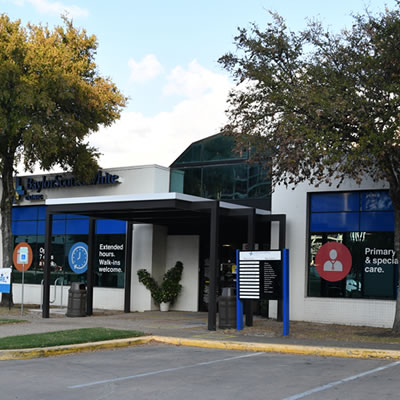
Baylor Scott & White Clinic - Austin North Burnet
2608 Brockton Dr , Austin, TX, 78758
- Monday: 8:00 am - 5:00 pm
- Tuesday: 8:00 am - 5:00 pm
- Wednesday: 8:00 am - 5:00 pm
- Thursday: 8:00 am - 5:00 pm
- Friday: 8:00 am - 5:00 pm
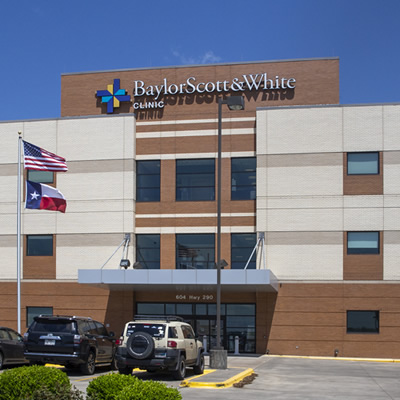
Baylor Scott & White Clinic - Brenham Hwy 290
604 US 290 , Brenham, TX, 77833
- Monday: 7:00 am - 5:00 pm
- Tuesday: 7:00 am - 5:00 pm
- Wednesday: 7:00 am - 5:00 pm
- Thursday: 7:00 am - 7:00 pm
- Friday: 7:00 am - 5:00 pm
- Saturday: 8:00 am - 12:00 pm
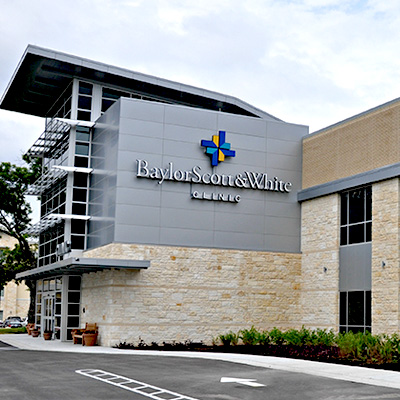
Baylor Scott & White Clinic - Cedar Park
910 E Whitestone Blvd , Cedar Park, TX, 78613
- Monday: 8:00 am - 5:00 pm
- Tuesday: 8:00 am - 5:00 pm
- Wednesday: 8:00 am - 5:00 pm
- Thursday: 8:00 am - 5:00 pm
- Friday: 8:00 am - 5:00 pm
- Monday: 7:00 am - 5:00 pm
- Tuesday: 7:00 am - 5:00 pm
- Wednesday: 7:00 am - 5:00 pm
- Thursday: 7:00 am - 5:00 pm
- Friday: 7:00 am - 5:00 pm
- Saturday: 9:00 am - 2:00 pm

Baylor Scott & White Clinic - College Station Rock Prairie
800 Scott and White Dr , College Station, TX, 77845
- Monday: 7:30 am - 5:00 pm
- Tuesday: 7:30 am - 5:00 pm
- Wednesday: 7:30 am - 5:00 pm
- Thursday: 7:30 am - 5:00 pm
- Friday: 7:30 am - 5:00 pm
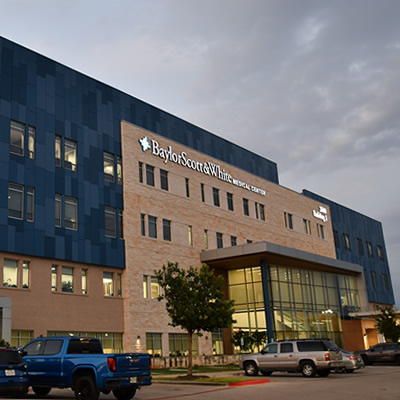
Baylor Scott & White Clinic - Pflugerville Medical Center (Building 1)
2600 E Pflugerville Pkwy Bldg 1, Ste 200, Pflugerville, TX, 78660
- Monday: 8:00 am - 5:00 pm
- Tuesday: 8:00 am - 5:00 pm
- Wednesday: 8:00 am - 5:00 pm
- Thursday: 8:00 am - 5:00 pm
- Friday: 8:00 am - 5:00 pm
- Monday: 7:30 am - 4:00 pm
- Tuesday: 7:30 am - 4:00 pm
- Wednesday: 7:30 am - 4:00 pm
- Thursday: 7:30 am - 4:00 pm
- Friday: 7:30 am - 4:00 pm

Baylor Scott & White Clinic - Pflugerville Medical Center Building 2
2600 E Pflugerville Pkwy Building 2, Pflugerville, TX, 78660
- Monday: 8:00 am - 5:00 pm
- Tuesday: 8:00 am - 5:00 pm
- Wednesday: 8:00 am - 5:00 pm
- Thursday: 8:00 am - 5:00 pm
- Friday: 8:00 am - 5:00 pm
- Monday: 8:00 am - 4:00 pm
- Tuesday: 8:00 am - 4:00 pm
- Wednesday: 8:00 am - 4:00 pm
- Thursday: 8:00 am - 4:00 pm
- Friday: 8:00 am - 4:00 pm
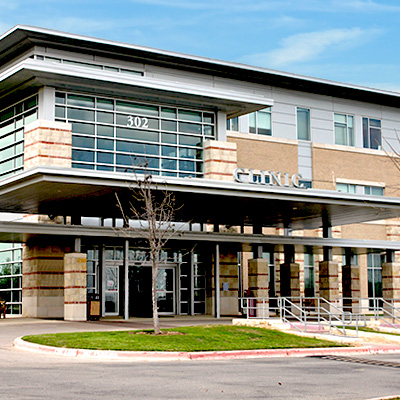
Baylor Scott & White Clinic - Round Rock 302 University
302 University Blvd , Round Rock, TX, 78665
- Monday: 8:00 am - 5:00 pm
- Tuesday: 8:00 am - 5:00 pm
- Wednesday: 8:00 am - 5:00 pm
- Thursday: 8:00 am - 5:00 pm
- Friday: 8:00 am - 5:00 pm
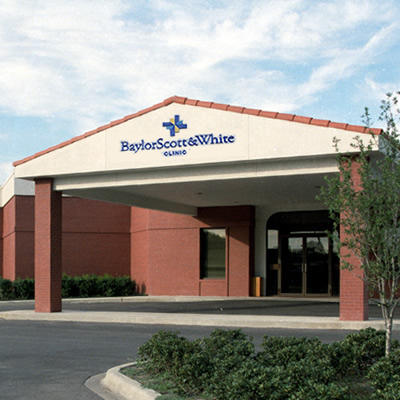
Baylor Scott & White Clinic - Santa Fe
1402 W Ave H , Temple, TX, 76504
- Monday: 8:00 am - 5:00 pm
- Tuesday: 8:00 am - 5:00 pm
- Wednesday: 8:00 am - 5:00 pm
- Thursday: 8:00 am - 5:00 pm
- Friday: 8:00 am - 5:00 pm
- Monday: 7:00 am - 4:30 pm
- Tuesday: 7:00 am - 4:30 pm
- Wednesday: 7:00 am - 4:30 pm
- Thursday: 7:00 am - 4:30 pm
- Friday: 7:00 am - 4:30 pm

Baylor Scott & White Clinic - Temple
2401 S 31st St , Temple, TX, 76508
- Monday: 8:00 am - 5:00 pm
- Tuesday: 8:00 am - 5:00 pm
- Wednesday: 8:00 am - 5:00 pm
- Thursday: 8:00 am - 5:00 pm
- Friday: 8:00 am - 5:00 pm
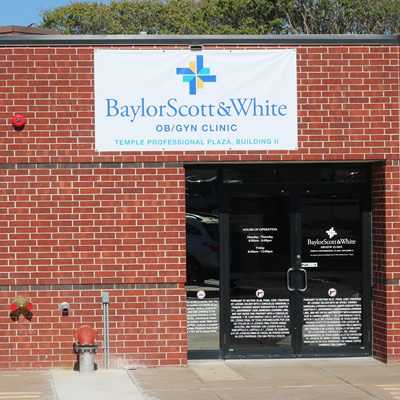
Baylor Scott & White Clinic - Temple Professional Plaza II
1713 SW H K Dodgen Loop Bldg II, Ste 100, Temple, TX, 76502
- Monday: 8:00 am - 6:00 pm
- Tuesday: 8:00 am - 6:00 pm
- Wednesday: 8:00 am - 6:00 pm
- Thursday: 8:00 am - 6:00 pm
- Friday: 8:00 am - 12:00 pm

Baylor Scott & White Medical Center - Austin
5245 W US Hwy 290 Service Rd , Austin, TX, 78735

Baylor Scott & White Medical Center - Brenham
700 Medical Pkwy , Brenham, TX, 77833

Baylor Scott & White Medical Center - Buda
5330 Overpass Rd , Buda, TX, 78610

Baylor Scott & White Medical Center - Centennial
12505 Lebanon Rd , Frisco, TX, 75035

Baylor Scott & White Medical Center - College Station
700 Scott and White Dr , College Station, TX, 77845
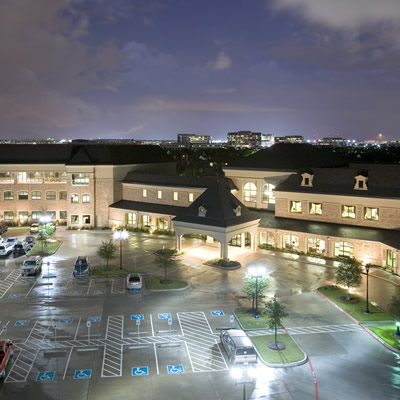
Baylor Scott & White Medical Center - Frisco
5601 Warren Pkwy , Frisco, TX, 75034
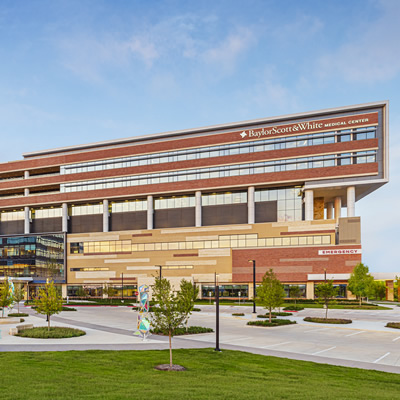
Baylor Scott & White Medical Center - Frisco at PGA Parkway
7600 Better Way , Frisco, TX, 75033

Baylor Scott & White Medical Center - Grapevine
1650 W College St , Grapevine, TX, 76051
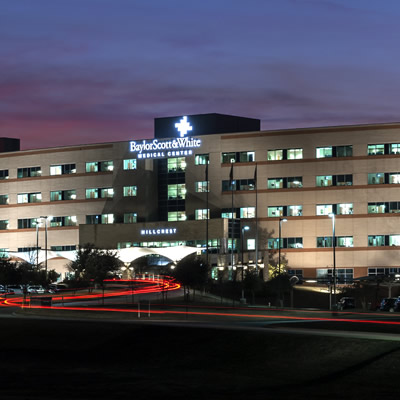
Baylor Scott & White Medical Center - Hillcrest
100 Hillcrest Medical Blvd , Waco, TX, 76712

Baylor Scott & White Medical Center - Irving
1901 N MacArthur Blvd , Irving, TX, 75061

Baylor Scott & White Medical Center - Lake Pointe
6800 Scenic Dr , Rowlett, TX, 75088

Baylor Scott & White Medical Center - Lakeway
100 Medical Pkwy , Lakeway, TX, 78738

Baylor Scott & White Medical Center - Marble Falls
810 W State Hwy 71 , Marble Falls, TX, 78654

Baylor Scott & White Medical Center - McKinney
5252 W University Dr Highway 380 at Lake Forest Drive, McKinney, TX, 75071
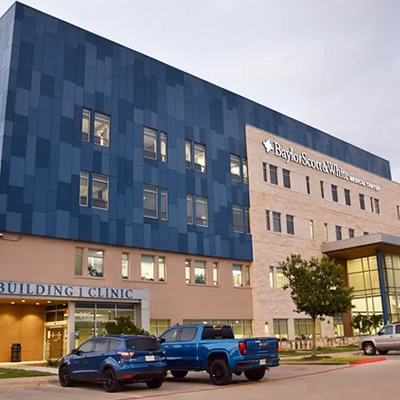
Baylor Scott & White Medical Center - Pflugerville (Building 1)
2600 E Pflugerville Pkwy Bldg 1, Ste 100, Pflugerville, TX, 78660

Baylor Scott & White Medical Center - Plano
4700 Alliance Blvd , Plano, TX, 75093

Baylor Scott & White Medical Center - Round Rock
300 University Blvd , Round Rock, TX, 78665
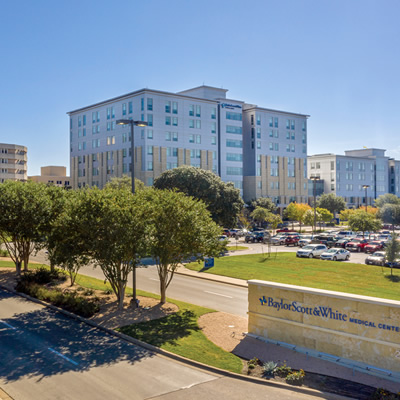
Baylor Scott & White Medical Center - Temple
2401 S 31st St , Temple, TX, 76508

Baylor Scott & White Medical Center - Waxahachie
2400 N Interstate 35E , Waxahachie, TX, 75165

Baylor Scott & White OB/GYN Clinic - Waco
120 Hillcrest Medical Blvd Office Building 2, Ste 201-2, Waco, TX, 76712
- Monday: 8:00 am - 5:00 pm
- Tuesday: 8:00 am - 5:00 pm
- Wednesday: 8:00 am - 5:00 pm
- Thursday: 8:00 am - 5:00 pm
- Friday: 8:00 am - 5:00 pm

Baylor Scott & White Obstetrics & Gynecology - Frisco
4461 Coit Rd Ste 205, Frisco, TX, 75035
- Monday: 8:00 am - 4:45 pm
- Tuesday: 8:00 am - 4:45 pm
- Wednesday: 8:00 am - 4:45 pm
- Thursday: 8:00 am - 4:45 pm
- Friday: 8:00 am - 4:30 pm
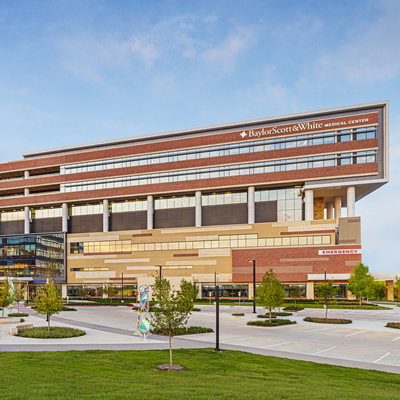
Baylor Scott & White Obstetrics & Gynecology - Frisco at PGA Parkway
16050 Everwell Ln Professional Pavilion I, Ste 200, Frisco, TX, 75033
- Monday: 8:00 am - 4:45 pm
- Tuesday: 8:00 am - 4:45 pm
- Wednesday: 8:00 am - 4:45 pm
- Thursday: 8:00 am - 4:45 pm
- Friday: 8:00 am - 4:30 pm

Baylor Scott & White Obstetrics & Gynecology - Grapevine
1631 Lancaster Dr Ste 370, Grapevine, TX, 76051
- Monday: 8:00 am - 5:00 pm
- Tuesday: 8:00 am - 5:00 pm
- Wednesday: 8:00 am - 5:00 pm
- Thursday: 8:00 am - 5:00 pm
- Friday: 8:00 am - 5:00 pm

Baylor Scott & White Obstetrics & Gynecology - Rockwall
1005 W Ralph Hall Pkwy Ste 115, Rockwall, TX, 75032
- Monday: 8:00 am - 5:00 pm
- Tuesday: 8:00 am - 5:00 pm
- Wednesday: 8:00 am - 5:00 pm
- Thursday: 8:00 am - 5:00 pm
- Friday: 8:00 am - 5:00 pm

Baylor Scott & White Obstetrics & Gynecology - Rowlett
9500 Lakeview Pkwy Ste 100, Rowlett, TX, 75088
- Monday: 8:00 am - 5:00 pm
- Tuesday: 8:00 am - 5:00 pm
- Wednesday: 8:00 am - 5:00 pm
- Thursday: 8:00 am - 5:00 pm
- Friday: 8:00 am - 5:00 pm

Baylor Scott & White Obstetrics & Gynecology - Waxahachie
2460 N Interstate 35E Ste 225, Waxahachie, TX, 75165
- Monday: 9:00 am - 4:30 pm
- Tuesday: 9:00 am - 4:30 pm
- Wednesday: 9:00 am - 4:30 pm
- Thursday: 9:00 am - 4:30 pm
- Friday: 9:00 am - 4:30 pm

Baylor Scott & White Park Lane OB/GYN Associates
9101 N Central Expy Ste 250, Dallas, TX, 75231
- Monday: 8:00 am - 4:30 pm
- Tuesday: 8:00 am - 4:30 pm
- Wednesday: 8:00 am - 4:30 pm
- Thursday: 8:00 am - 4:30 pm
- Friday: 8:00 am - 4:30 pm

Baylor Scott & White Specialty Clinic - Harker Heights
907 Mountain Lion Cir , Harker Heights, TX, 76548
- Monday: 8:00 am - 5:00 pm
- Tuesday: 8:00 am - 5:00 pm
- Wednesday: 8:00 am - 5:00 pm
- Thursday: 8:00 am - 5:00 pm
- Friday: 8:00 am - 5:00 pm

Baylor Scott & White Specialty Clinic - Killeen Hemingway
2405 S Clear Creek Rd , Killeen, TX, 76549
- Monday: 8:00 am - 5:00 pm
- Tuesday: 8:00 am - 5:00 pm
- Wednesday: 8:00 am - 5:00 pm
- Thursday: 8:00 am - 5:00 pm
- Friday: 8:00 am - 5:00 pm
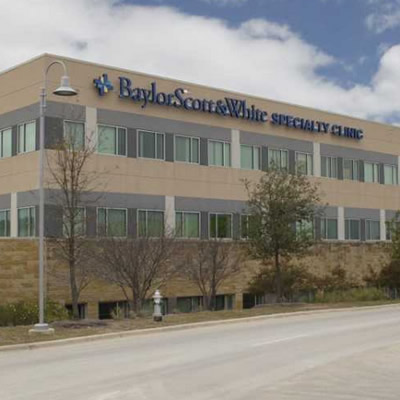
Baylor Scott & White Specialty Clinic - Lakeway
200 Medical Pkwy , Lakeway, TX, 78738
- Monday: 8:00 am - 5:00 pm
- Tuesday: 8:00 am - 5:00 pm
- Wednesday: 8:00 am - 5:00 pm
- Thursday: 8:00 am - 5:00 pm
- Friday: 8:00 am - 5:00 pm
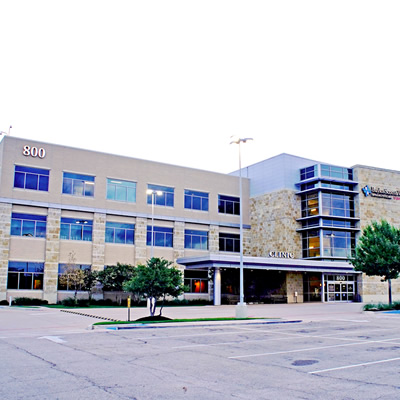
Baylor Scott & White Specialty Clinic - Marble Falls
800 W State Hwy 71 , Marble Falls, TX, 78654
- Monday: 8:00 am - 5:30 pm
- Tuesday: 8:00 am - 5:30 pm
- Wednesday: 8:00 am - 5:30 pm
- Thursday: 8:00 am - 5:30 pm
- Friday: 8:00 am - 5:30 pm

Baylor Scott & White Specialty Clinic - Salado
213 Millcreek Dr Ste 190, Salado, TX, 76571
- Monday: 8:00 am - 5:00 pm
- Tuesday: 8:00 am - 5:00 pm
- Wednesday: 8:00 am - 5:00 pm
- Thursday: 8:00 am - 5:00 pm
- Friday: 8:00 am - 5:00 pm

Baylor Scott & White Surgicare - Dallas
4020 Junius St , Dallas, TX, 75246
- Monday: 6:00 am - 5:00 pm
- Tuesday: 6:00 am - 5:00 pm
- Wednesday: 6:00 am - 5:00 pm
- Thursday: 6:00 am - 5:00 pm
- Friday: 6:00 am - 5:00 pm

Baylor Scott & White Surgicare - Garland
530 Clara Barton Blvd Ste 100, Garland, TX, 75042
- Monday: 6:00 am - 5:00 pm
- Tuesday: 6:00 am - 5:00 pm
- Wednesday: 6:00 am - 5:00 pm
- Thursday: 6:00 am - 5:00 pm
- Friday: 6:00 am - 5:00 pm
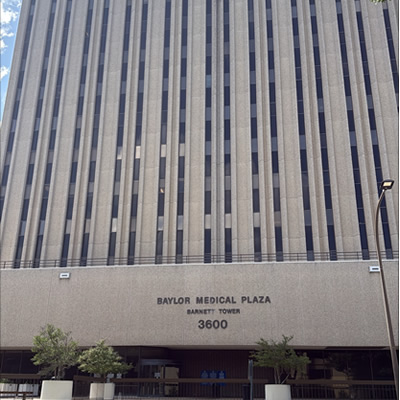
Baylor Scott & White Women's Health Group
3600 Gaston Ave Wadley Tower, Ste 1158, Dallas, TX, 75246
- Monday: 9:00 am - 5:00 pm
- Tuesday: 9:00 am - 5:00 pm
- Wednesday: 9:00 am - 5:00 pm
- Thursday: 9:00 am - 5:00 pm
- Friday: 9:00 am - 4:30 pm

Baylor Scott & White Women’s Health Specialists - Waxahachie
2460 N Interstate 35E Ste 165, Waxahachie, TX, 75165
- Monday: 8:00 am - 5:00 pm
- Tuesday: 8:00 am - 5:00 pm
- Wednesday: 8:00 am - 5:00 pm
- Thursday: 8:00 am - 5:00 pm
- Friday: 8:00 am - 5:00 pm

Baylor University Medical Center, part of Baylor Scott & White Health
3500 Gaston Ave , Dallas, TX, 75246
Frequently asked questions
-
Can urinary incontinence be cured?
While a complete cure is not guaranteed, many cases of urinary incontinence can be effectively managed and improved through lifestyle changes, exercises, medications or medical interventions.
-
Can urinary incontinence cause urinary tract infections (UTIs)?
Yes, urinary incontinence can increase the risk of UTIs, as it may lead to incomplete emptying of the bladder, providing a conducive environment for bacteria to multiply.
-
When does urinary incontinence start in pregnancy?
Urinary incontinence can start during early pregnancy due to hormonal changes and pressure on the bladder. It may become more pronounced as the uterus grows and puts pressure on the pelvic floor.
-
Can urinary incontinence cause yeast infections?
Yes, urinary incontinence can contribute to yeast infections, as continuous exposure to moisture in the genital area may create an environment conducive to yeast growth. Proper hygiene helps lower this risk.
How we reviewed this page
-
August 04, 2025

